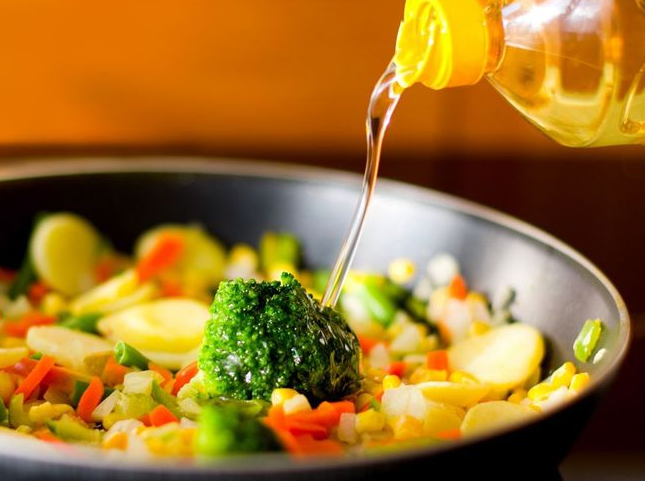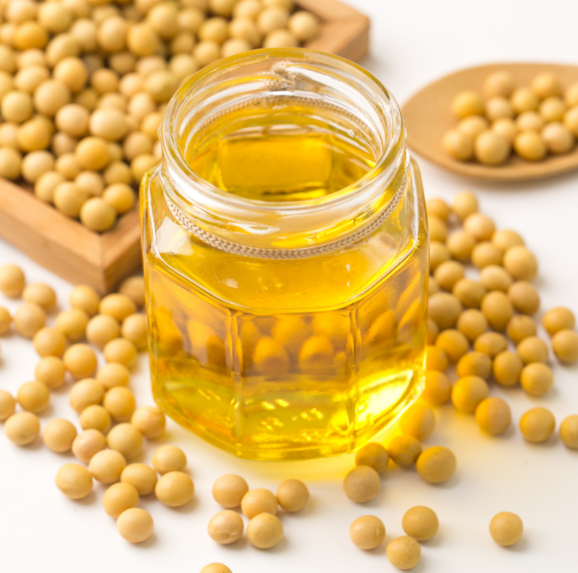How should oil be stored?
Oil should not be placed near the stove to prevent rancidity caused by high temperature.
Principle: Rancidity is the carboxyl group that becomes acid after oxidation, which has certain acidity. Rancidity will produce some deposits in the blood vessels, which will cause the body's blood vessels to narrow and other harms.
What are the small ways to store oil?
Method ① Do not place the small bottles beside the stove;
Method ② It is recommended to use black plastic bags to pack the large bottles.
Principle: ①Using a small oil can to hold the oil can control the intake of oil, and at the same time can avoid frequent opening of the large oil bottle. Keep the oil away from the stove with high temperature to avoid accelerated oil oxidation. ②Wrap the oil with a black plastic bag to protect it from light, isolate moisture and air, and reduce the probability of oil oxidation.

Let me introduce to you how to maximize the nutrition of various oils.
1. Peanut oil——the most suitable oil for cooking.
The ratio of saturated fatty acids, monounsaturated fatty acids and polyunsaturated fatty acids in peanut oil is about 3:4:3. It is a balanced vegetable oil, in which vitamin E and carotene are preserved. More.
Healthy eating:
It is suitable for general cooking, such as baking, cooking for a long time, and stir-frying. Try to avoid high-temperature frying and deep frying.
Precautions:
Peanut oil is divided into pressed products and solvent-extracted products. The former is more fragrant. When buying, it is best to choose large-brand and high-grade products. This is because peanuts are easily contaminated by aflatoxins, and this toxin is easily soluble in oil. Inferior peanut oil has this risk.
2. Soybean oil——cooking oil fume is relatively large
The fatty acid composition of soybean oil is 51.7% of linoleic acid, 22.4% of oleic acid, 6.7% of linoleic acid and 11.1% of palmitic acid. Due to the rich content of linoleic acid, it belongs to the high-linoleic acid type vegetable oil and is rich in vitamin E.
Why soybean oil is not suitable for cooking:
There are experiments to study the concentration and composition of oil fume produced by four common edible oils. The ranking of oil fume concentration is: soybean oil> corn oil> rapeseed oil> peanut oil.
The research results show that, under the same cooking conditions, the concentration of soy oil and the types and total concentration of harmful substances are significantly higher than the other three edible oils.
Healthy eating:
Vegetable oil is resistant to heat, so it is best to only use it for low-temperature cooking, such as pastry, soup and filling.

3. Olive oil——best cold dressing
Olive oil is considered to be the most suitable fat for human nutrition among the fats found so far. Studies have found that olive oil helps prevent high blood pressure, reduce peripheral vascular diseases, and improve brain function.
Healthy eating:
It is best to use olive oil to cool, bake, and saute food, and avoid frying. If it is high-grade virgin olive oil: it is best to only use it for cold salads or soups.
Precautions:
When buying, choose pressed products first, and the quality is better.
4. Rapeseed oil——can be used for daily frying
Rapeseed oil is what we commonly call rape oil, also called coriander oil. Rapeseed oil contains very little cholesterol and generally contains certain seed phospholipids, which are very important for the development of blood vessels, nerves, and brain. The human body's absorption rate of rapeseed oil is as high as 99%, which can regulate blood pressure, blood sugar, and blood lipids, and enhance immunity.
Precautions:
(1) Some rapeseed oil contains relatively high erucic acid, which affects its nutritional value. Therefore, heat the wok and pour in rapeseed oil, and cook for a while to allow part of the erucic acid to evaporate.
(2) Rapeseed oil should be consumed as soon as possible after the bottle is opened. If it is left for too long, the polyunsaturated fatty acids in it are easily oxidized and destroyed by oxygen in the air, producing substances that are harmful to the human body.

5. Linseed oil——cold dressing
The essential fatty acid linolenic acid content in linseed oil is more than 50%, which is much higher than 5% of deep-sea fish oil and 6%-12% of walnut and pine nut. It can be called "land fish oil".
Healthy eating:
It is best used in cold dressing, because linseed oil is easy to oxidize and polymerize and is the least heat resistant.
Expert advice:
Children, pregnant women, the elderly, etc. can choose linseed oil appropriately, which is good for intellectual development and delaying memory decline.
Precautions:
The degree of unsaturation of linseed oil is too high, so eat it as soon as possible after opening.
6. Lard, butter, butter——processed noodles
This type of grease has better heat resistance and less oxidation and polymerization after being heated for a long time, which is the most prominent advantage. However, most animal fats contain more cholesterol. Taking lard as an example, it contains an average of 93 mg of cholesterol per 100g, which is not suitable for patients with cardiovascular diseases.
Healthy eating:
This type of fat is often used for processing pasta and frying food to create a crispy taste.
Expert advice:
Except for people who exercise a lot, it is not recommended for most people to consume this type of fat regularly, because the intake of meat and milk is sufficient to obtain sufficient saturated fatty acids.
Pay attention to the amount of oil you eat every day! The recommended daily intake of oil for adults is about 20 to 30 grams.
If you want to know the edible oil processing technology, please feel free to contact us.
Copyright © Henan Zhongxing Grain And Oil Machinery Co.,Ltd. All Rights Reserved. Powered by MetInfo